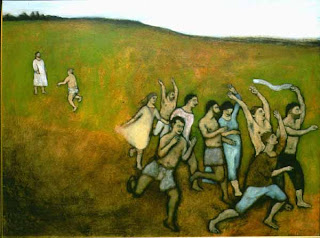Has none but this foreigner returned to give thanks to God?
Lk 17:11-19

EXAMINING THE GOSPEL TEXT
As he was entering a village, ten lepers met him. They stood at a distance from him and raised their voices, saying, "Jesus, Master! Have pity on us!"
Lepers are not only people with leprosy but also various kinds of skin disease that make one abhorrent to look at.
Is it significant that there are ten lepers? Yes. If Jesus cured one leper it shows he is powerful. But if he cured ten, it means he is really, really powerful.
The lepers met Jesus outside the village. Why? Lepers were cut off from the community. They live outside villages. They can not enter villages.
They stood at a distance because they can not come near other people. Why? The obvious reason is to prevent other people from getting the disease. But there is a religious reason, too. Their skin disease prevented them from reflecting externally the holiness of Yahweh.
And when he saw them, he said, "Go show yourselves to the priests. As they were going they were cleansed.
That they obeyed Jesus meant that they believed that Jesus would cure them. And in fact, as they went, they were cured. Why was going to the priests an act of faith? Because when one has been cured of leprosy, he went to the priests for the rite of purification. That rite publicly confirms that the person is really cured and can now live with the community.
And one of them, realizing he had been healed, returned, glorifying God in a loud voice.
When something wonderful happens to you, you would like to let the world know about it. That is the reason why the man who was cured was thanking God in a loud voice.
He was a Samaritan.
Just as in the parable of the Good Samaritan, so also here the hero is not a Jew but a Samaritan.
Then he said to him, "Stand up and go; your faith has saved you."
What did the Samaritan believe? Not only that Jesus would cure him. He also believed that Jesus came from God.
GIVING THANKS
Let us examine the sequence of events in this episode. Jesus came to face with a disease. The ten lepers did not only suffer from a physical ailment. Because they were excluded from the community, they also suffered emotionally. The reaction of Jesus was compassion and mercy. Jesus did not only feel sorry for them. Jesus did something for them. He cured them. The response of the Samaritan was thanksgiving.
Thanking God
Once upon a time a cowboy became a member of the charismatic renewal. So he taught his horse to respond to special commands. When he said, “Thanks be to God” the horse would gallop. When he said, “Praise the Lord” the horse would stop. One day when he was riding his horse, a snake frightened the horse. So the horse started galloping. But at a distance, was a ravine. The cowboy panicked. In his panic he forgot the command for stopping the horse. So he prayed to God to help him remember. Just before reaching the ravine, he remembered the com-mand. He shouted, “Praise the Lord.” And the horse stopped. The cowboy gave a sigh of relief and said, “Thanks be to God.”
When was the last time you thanked God? How often do we thank God? In the first place are we aware of what to thank God for? Is there something more we can do to say thank you to God?
Thanking others
There was an old immigrant woman in the US. But for some reason, she was brought to court. However, the judge ruled in her favour. The following day, the woman brought a bag of coins and brought it to the judge to say thank you. Of course, the judge said thank you but told the woman to keep the money.
Have we formed the habit of saying thank you? At home do you say thank you to one another? Do you teach your children by word and example to say thanks?
Have you seen the film Pay It Forward? What does Pay It Forward mean? When someone does you a favour, you say thank you to that person. When you pay it forward, you do one more thing. You do a favour to another person. Why don’t you give thanks by paying it forward?
Remembering
Gratitude is the memory of the heart. It is easy to be grateful when we remember.
Let me give you an assignment in order to put into practice the message of today’s gospel. Find some time today to remember the good things that have hap-pened to you. Remember the people who were involved in those things. Thank God for those good things. Finally, ask God to bless those people who made those good things happen to you.
Gratitude is the memory of the heart. It is easy to be grateful when we remember.
---------------------
The Salesians of Don Bosco is a religious congregation of priests and brothers dedicated to the welfare of the young. If you feel called by God to give your life for the good of the young, you may want help in discovering if this is really God's will for you. Please get in touch with the Vocation Director (Don Bosco North Province, Philippines) - 0917-7930112 - finvoc@yahoo.com - Bro. MON CALLO SDB.
No comments:
Post a Comment